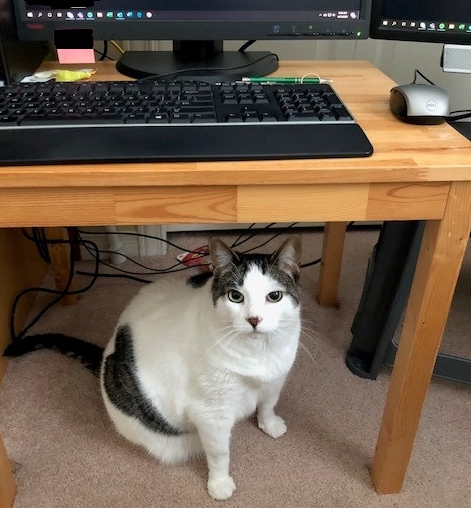- Continued social distancing could save thousands of lives, says Waterloo study
- Donna Strickland, Linda Nazar join ranks of Royal Society
- HR hosted seminar on continuous improvement
- Remote teaching templates now available; Global Insights series; other notes
- Another day, another batch of Good Buddies of the University
Editor:
Brandon Sweet
University Communications
bulletin@uwaterloo.ca
Continued social distancing could save thousands of lives, says Waterloo study

Canadian provinces such as Ontario and Quebec should wait several more months before lifting social distancing restrictions, according to the findings of a new mathematical model developed by University of Waterloo researchers.
The new model, called Distancing-SEIRD, indicates that continuing social distancing at the current levels in Ontario and Quebec for six months (until mid-September), could save close to 100,000 lives.
The machine learning-enabled model was recently the subject of a study that is pending peer review.
“I think we need to wait to ease the social distancing restrictions,” said Mohammad Kohandel, a professor in Waterloo’s Department of Applied Mathematics. “People are tired of the social distancing restrictions, but they need to be patient as we need to continue this a little bit longer and then start to remove things gradually as that seems to be the best approach.
“To keep the number of patients who need the treatments below the number of resources available, we need to go four to six months with social distancing from the time it started.”
In undertaking the study, the researchers modified a standard mathematical model that is used in epidemiology to simulate the spread of infections, called an SEIRD model. They used a machine-learning algorithm to feed the model data collated by the Johns Hopkins University Center for Systems Science and Engineering collected from 184 countries between January 22, 2020, and April 13, 2020. The data includes daily counts of confirmed COVID-19 cases, deaths, and daily counts of people who have recovered from the disease.
The researchers also used the cellphone tracking data that was collected by Google for North America but explored the results for Canada to find the ranges of people who were adhering to social distancing. The data showed that approximately 60 per cent of people are practicing social distancing in Ontario, and 70 per cent in Quebec.
The Distancing-SEIRD model then predicted that the total number of deaths over six months in Ontario with no social distancing would be as high as over 100,000 people. In contrast, a more strict case of social distancing, with 60 per cent adherence, would result in a drastic reduction in the death toll – reducing fatalities by more than 50 per ent over the first six months.
With Quebec having experienced higher numbers of COVID-19 cases, the model indicates that strict social distancing measures could save tens of thousands of lives over six months, compared to no social distancing.
“Our model parameters are all fixed assuming that everything remains the same,” said Michelle Przedborski, a Research Assistant Professor in Waterloo’s Faculty of Mathematics. “The model shows that if we have a strict social distancing policy and then we stop social distancing all at once the tendency is that we don’t actually flatten the curve, we just shift the infection peak. And effectively, we risk having the same peak numbers of infections as we would if we hadn’t social distanced.”
The mathematicians are currently working on an extension of the model to include the effects of other factors, such as sex and age. They are keen to work on the model further with public health officials to aid in the making of policy decisions.
The study, Mathematical modeling of COVID-19 containment strategies with considerations for limited medical resources, authored by Mohammad, Michelle, and Waterloo’s PhD candidates Brydon Eastman and Cameron Meaney, has been submitted for publication.
Note: This research has not yet been peer-reviewed and is being released as part of UWaterloo’s commitment to helping inform Canada’s COVID-19 response.
Donna Strickland, Linda Nazar join ranks of Royal Society
Professor and Nobel Laureate Donna Strickland and University Professor and Canada Research Chair Linda Nazar have been named Fellows of the Royal Society, the world's oldest independent scientific academy.
Strickland and Nazar join more than 60 exceptional scientists from around the world who have been elected as Fellows and Foreign Members of the Royal Society. The 51 new Fellows, 10 Foreign Members and one Honorary Fellow have been selected for their outstanding contributions to scientific understanding.
"They embody the global nature of science, with representation from Sweden, Israel, Germany, Australia, Canada, UK-born scientists working in Europe and beyond, and researchers from around the world enriching Britain’s own research and innovation sector," says a Royal Society news release. "Their ranks include six Nobel laureates, as well as internationally recognised leaders in industry and science policy."
Donna Strickland, professor of Physics in the Department of Physics and Astronomy, is honoured as a Fellow for her co-invention of Chirped Pulse Amplification. This revolution in laser science has led to advances in fields as diverse as astrophysics, surgery and nuclear fusion research, and saw her share the 2018 Nobel Prize in Physics.
Linda Nazar is Professor and Canada Research Chair in Solid State Energy Materials in Waterloo's Department of Chemistry and a member of the Waterloo Institute for Nanotechnology, and is honoured as a Fellow for her research on electrochemical energy storage with topics that span Li-ion batteries and ’beyond Li-ion’, and solid state ionics.
“At this time of global crisis, the importance of scientific thinking, and the medicines, technologies and insights it delivers, has never been clearer. Our Fellows and Foreign Members are central to the mission of the Royal Society, to use science for the benefit of humanity," says Venki Ramakrishnan, president of the Royal Society. “While election to the Fellowship is a recognition of exceptional individual contributions to the sciences, it is also a network of expertise that can be drawn on to address issues of societal, and global significance. This year’s Fellows and Foreign Members have helped shape the 21stcentury through their work at the cutting-edge of fields from human genomics, to climate science and machine learning."
The Royal Society is a self-governing fellowship made up of the most eminent scientists, engineers and technologists from the UK and the Commonwealth. Its Foreign Members are drawn from the rest of the world. Fellows and Foreign Members are elected for life through a peer review process based on excellence in science. There are approximately 1,700 Fellows and Foreign Members, including around 70 Nobel Laureates. Each year up to 52 Fellows and up to 10 Foreign Members are elected from a group of around 800 candidates who are proposed by the existing Fellowship.
New Fellows are formally admitted to the Society at the Admissions Day ceremony, traditionally in July, when they sign the Charter Book and the Obligation of the Fellows of the Royal Society. However, the Royal Society reports that, considering current circumstances, this year’s Admissions Day will take place in May 2021.
HR hosted seminar on continuous improvement
On March 12, Human Resources hosted a Continuous Improvement (CI) Seminar for the University of Waterloo Leadership and executive team as well as leaders from the University of Toronto, Laurier, Carleton, McMaster, and Ryerson.
The seminar was presented by John Hogg, director of continuous improvement, from the University of Strathclyde in Glasgow, Scotland. John is responsible for providing leadership and direction to the University’s continuous improvement activity and national Higher Education agendas including Value for Money, Effectiveness and Efficiencies.
John presented on the Continuous Improvement framework, strategies, and adoption approach within the University of Strathclyde and shared case studies and examples on continuous improvement projects and initiatives his team has accomplished. In addition, attendees participated in working groups on an activity to develop an ideal continuous improvement framework within the higher education sector by brainstorming important tactics using three factors: purpose, approach, and leadership behaviors. These tactics were organized using colored sticky notes and added on a physical chart that attendees were able to take back to their departments to begin applying what they learned in the seminar within their teams.
In addition to hearing John Hogg speak and learning from his University’s CI journey, attendees had the opportunity to network and engage with like-minded individuals across several universities within Ontario and continue to build their continuous improvement network.
For more information on Continuous Improvement within the University of Waterloo, please visit our Lean website. If you would like to be included on the mailing list for future CI events at Waterloo, please contact Raghda Sabry. If you have any other questions regarding CI within the University of Waterloo please contact Kimberley Snage.
Remote teaching templates now available; Global Insights series; other notes

Jim Frank, professor emeritus in Kinesiology, snapped this picture of a family of geese observing traffic safety protocols at the University's south campus entrance. "My wife, Jackie, and I were walking on the UW campus," Jim wrote. "It’s a 'ghost town' except for the geese, which appear to be maintaining social distancing like ourselves. While crossing University Avenue at the front entry to campus, we saw our first goslings of the year."
"Instructors, are you looking for a starting point for your LEARN course site in the spring term?" asks the Centre for Extended Learning. "We’ve created a site in LEARN which provides you with a simple and well-designed course structure, a series of template pages, and instructions on how to download and use each component. To access the site, click on “Self-Registration” on your LEARN homepage and select “Templates for Remote Teaching” from the list." Please contact remoteteaching@uwaterloo.ca for further information.
The Balsillie School of International Affairs, a joint venture of the University of Waterloo, Laurier and the Centre for International Governance Innovation, is launching Global Insights, a weekly live-streamed, moderated panel series on the challenges that COVID-19 poses for global governance. The series will provide different national and regional perspectives on big questions currently facing researchers, policymakers and planners worldwide in light of the Coronavirus pandemic. It will launch this Thursday, April 30 with the topic “COVID-19: Stress-test for the Global Economy”.
The first Global Insights panel will feature Dr. John Ravenhill together with experts from the Department of Politics & International Studies at the University of Warwick (UK), the School of International Service at American University (US), and the Institute of Strategic Affairs in Addis Ababa (Ethiopia) – all leading institutions in the study of international affairs.
“The Panel series is a collaborative effort which draws on the views of intellectual leaders from various corners of the globe to contribute informed perspectives on a range of different global challenges - both during and beyond the COVID-19 pandemic,“ says BSIA Director Dr. Ann Fitz-Gerald. Future sessions will include such themes as The Changing Global Balance of Power; A New Concept of Security; The Future of Democracy; Federalism; Climate Change; Public Health; Technology Innovation; Data, Digitalisation and Governance; Migration and Mobility; and Multilateralism and International Cooperation, and more.
Another day, another batch of Good Buddies of the University

"This is Tyson, thinking ‘you let me bring my outside toy in and now you’re working!’" writes Emma Courlander, administrative assistant, senior management team, Campus Wellness.

"This is Bella," writes Ryan Comfort, administrative co-ordinator in the Registrar's Office, "keeping an intense eye to ensure tasks are completed."

"Harlow (The Grey) and little brother Frank (Grilled Cheese) are useless at the "working" part of working from home but insist on being on my work space," writes Carrie Nickerson, student engagement and communications specialist in the Student Success Office. "When their eyes are open, Frank is trying to catch the mouse arrow on my screens with his teeth and Harlow enjoys standing directly in front of the laptop during video meetings."

"This is Paisley (Miss P)," writes Donna Sutherland, administrative officer at the School of Accounting and Finance. "She is my good buddy while working from home and this is the non-stop look I get throughout the day because she would prefer that I take her for strolls in the neighborhood than attend to business."
Link of the day

45 years ago: the fall of Saigon
When and Where to get support
Instructors can visit the Keep Learning website to get support on adapting their teaching and learning plans for an online environment.
Employees can access resources to help them work remotely, including managing University records and privacy of personal information
Here are some tips for staying healthy while working from home:
The Writing and Communication Centre has gone virtual to provide assistance.
We understand that these circumstances can be troubling, and you may need to speak with someone for emotional support. Good2Talk is a post-secondary student helpline based in Ontario, Canada that is available to all students.
If you feel overwhelmed or anxious and need to talk to somebody, please contact the University’s Campus Wellness services, either Health Services or Counselling Services.
The Library has published a resource guide on how to avoid information overload.
The Faculty Association of the University of Waterloo (FAUW)continues to advocate for its members. Check out the FAUW blogfor more information.
The University of Waterloo Staff Association (UWSA) continues to advocate for its members. Check out the UWSA blog for more information.
WUSA supports for students:
Student Food Bank food hampers are currently available from the Turnkey Desk on weekdays from 9:00 a.m. to 4:00 p.m. in the Student Life Centre. If you have any questions please email us at foodbank@wusa.ca.
MATES – Providing general online Peer Support via Skype to undergraduate students. To set up an appointment, please contact mates@wusa.ca
Empower Me is a confidential mental health and wellness service that connects students with qualified counsellors 24/7. They can be reached at 1-844-741-6389.
Glow Centre - Providing online Peer Support for the LGBTQ2+ community via Skype to Undergraduate students. To set up an appointment, please contact glow@wusa.ca
The Women’s Centre – Providing online Peer Support via Skype to undergraduate students. To set up an appointment, please contact womenscentre@wusa.ca
Centre for Academic Policy Support - CAPS is here to assist Waterloo undergraduates throughout their experience in navigating academic policy in the instances of filing petitions, grievances and appeals. Please contact them at caps@wusa.ca . More information at http://wusa.ca/caps
WUSA Commissioners who can help in a variety of areas that students may be experiencing during this time:
- Equity – equity@wusa.ca
- Co-op and Experiential Affairs – coop.affairs@wusa.ca
WUSA Student Legal Protection Program - Seeking legal counsel can be intimidating, especially if it’s your first time facing a legal issue. The legal assistance helpline provides quick access to legal advice in any area of law, including criminal. Just call 1-833-202-4571.
When and Where it isn't
Please note: The University has suspended all in-person events until further notice. Please contact the event organizers to confirm whether the event has shifted to an online mode of delivery.
If you have listed an event with the Daily Bulletin and need to cancel, postpone or modify the listing, please send an email to bulletin@uwaterloo.ca.
If you have an upcoming event that has not yet appeared in the When and Where listing, please send an email to bulletin@uwaterloo.ca to confirm the event's status.
Warrior Recreation online workouts, Monday to Friday, three times a day at 10:30 a.m., 3:00 p.m. and 8:00 p.m. Workouts will be broadcast live through ZOOM Video Communications.
Writing and Communication Centre virtual writing cafés, Tuesdays, 9:00 a.m. to 12:00 p.m., Wednesdays, 2:00 p.m. to 4:30 p.m., Fridays, 9:00 a.m. to 12:00 noon.
Workplace Yoga Program is live-streaming classes on Tuesdays and Wednesdays from 12:05 p.m. to 12:50 p.m. in April and May.
Centre for Extended Learning course, “Full-featured screen recording with Camtasia,” Thursday, April 30, 10:00 a.m. Register on GoSignMeUp.
BSIA online seminar, Global Insights: “COVID-19: Stress-test for the Global Economy”featuring John Ravenhill, UW with Ann Fitz-Gerald, BSIA as moderator, Thursday, April 30, 11:00 a.m. to 12:00 p.m.
Centre for Teaching Excellence presents Diana Skrzydlo, "Tell Me What You Know: Oral Examinations to Assess and Enhance Student Learning,"Thursday, April 30, 3:30 p.m. to 4:30 p.m. Information available.
Centre for Teaching Excellence presents Remote Course Design Essentials, Wednesday, May 6, online.
Copyright for Teaching,Thursday, May 7, 10:00 a.m. to 11:30 a.m., online.
HREI Spring Training, Anti-Racism Workshop, facilitated by Dr. Gauthamie Poolokasingham, Thursday, May 7, 12:00 p.m. to 4:00 p.m.
HREI Spring Training, The History of Indigenous Peoples in Canada, hosted by Canadian Centre for Diversity and Inclusion, Thursday, May 7, 1:00 p.m. to 2:00 p.m.
Ask Us Anything: HREI and Your Campus, Friday, May 8, 12:00 noon to 12:45 p.m.